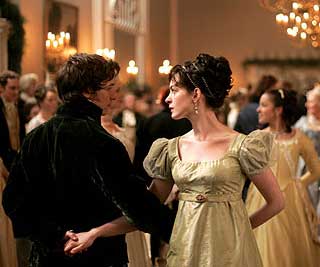|
With only six novels in the Austen canon, it could be argued that the film world has exhausted her oeuvre and is now turning to her biography and other spin-offs to keep Austen-mania stoked.
Becoming Jane, which opened in theatres last weekend, tells the story of AustenÕs love affair and secret engagement to a brash brawler by the name of Thomas Lefroy. (The Jane Austen Society of North America, which investigates these things, reports that Austen did meet a young Irishman by the name of Thomas Lefroy when they were both 20. They danced and sat down together on three other occasions, according to letters Austen wrote to her sister Cassandra.)
Following on the heels of Becoming Jane is a filmed adaptation of The Jane Austen Book Club, about five women and a man (!) who meet for a book club solely devoted to Austen novels. And coming to TV in the fall is Miss Austen Regrets, a BBC production, about a 40-ish Austen looking back on her romantic life.
'Bankable Hollywood commodity'
ÒSheÕs a real phenomenon, a bankable Hollywood commodity. WhoÕd have thought?” says English professor Ron Tetreault. ÒI think itÕs because she provides an escape into a world of fantasy and romance. But, as all my students know, thereÕs a lot more to her than that.”
Dr. Tetreault never worries if enough students will sign up for his class Ñ his fourth-year class (ENGL 4012) was filled as soon as it was posted. In his class, he enjoys talking about AustenÕs contemporary connections, especially Helen FieldingÕs smart re-imagining of Pride & Prejudice as Bridget JonesÕs Diary. That 1996 novel was part of the first wave of Austen-mania, kicked off just a year earlier with the BBC miniseries Pride & Prejudice, starring Jennifer Ehle as Elizabeth Bennett and Colin Firth as a smouldering Mr. Darcy.
ÒI think Helen Fielding is very wise about Jane Austen,” he says. ÒShe really got it right Ñ the ironic heroine, the pressure to marry, the humour.”
Austen's dark edge
Down the hall in the English department, Dr. TetreaultÕs colleague, Rohan Maitzen, rolls her eyes at the plot details of Becoming Jane. But she says the movie, which stars brunette beauty Anne Hathaway as Jane Austen, may lead people to back to the novels.
ÒAnd that can never be a bad thing,” says Dr. Maitzen, who teaches The 19th Century British Novel From Austen to Dickens (ENGL 3031) and its companion The 19th Century British Novel from Dickens to Hardy (ENGL 3032).
Once youÕve read one Austen novel, youÕre likely to be hooked Ñ theyÕre definitely not as airbrushed and dewy-eyed as the film adaptations might lead you to believe, she says.
ÒYou do get treated to the great spectacle of romance, with so much wit and good conversation. And thatÕs tremendously inviting,” says Dr. Maitzen. ÒBut at the same time, Austen has that dark edgeÉ in a novel like Pride & Prejudice, for example, the fate of the Bennett sisters isnÕt comic at all. These are women on an economic precipice.”

